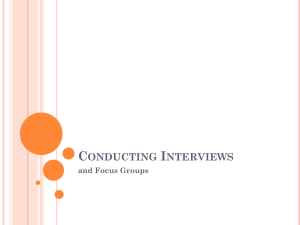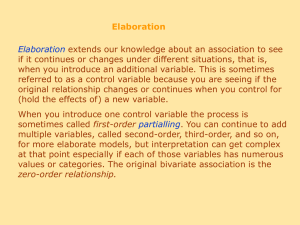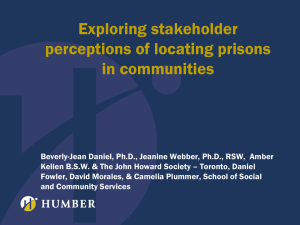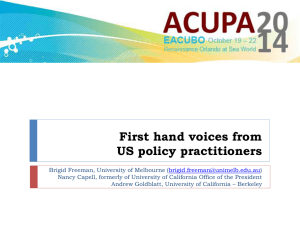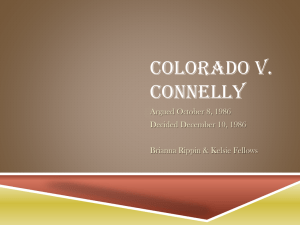New Teacher Educators - University of Cumbria
advertisement
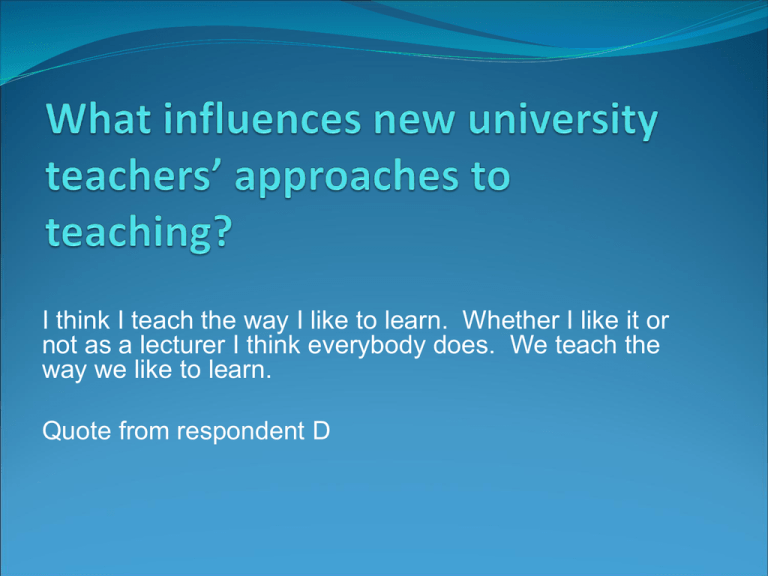
I think I teach the way I like to learn. Whether I like it or not as a lecturer I think everybody does. We teach the way we like to learn. Quote from respondent D The background to my research part 1 Changes in the national policy context: • Dearing (1997) Report of the National Committee of Inquiry into Higher Education recommended setting up programmes of initial professional development in teaching to promote teaching as a professional and scholarly activity. • Dearing also recommended the establishment of the Institute for Learning and Teaching in Higher Education later changed to the Higher Education Academy (HEA). • Establishment of Lifelong Learning UK in 2005 (LLUK) with responsibility for the professional development of staff working in higher education in the UK The background to my research part 2 The research evidence is unclear as to what has the greatest influence on university teachers’ development as new teachers. Discipline Colleagues/departments/learning on the job Concept of what good teaching is Training courses A solution looking for a problem to solve? “There is no reason to think that, in general, university teaching is inadequate. There is no reason to think that there is a need to reform, reorganize, and make accountable the sort of teaching that goes in universities. There is no reason to think that courses of teacher training are necessary for university lecturers. There is no reason to think that such training programs will benefit university lecturers or their students. There is no reason to think that there is a need for a professional body to promote the status of university teaching. There is no reason to think that university lecturers need to adopt a new ethic or vision to complement, supplement, or resist the impositions of such a body.” (Hayes, 2002: 143) Those who see the academic discipline as the key influence on the development of new university teachers argue that: “For a would-be academic, the process of developing that identity and commitment may well begin as an undergraduate, but is likely to be at its most intense at the postgraduate stage, culminating in the award of a doctorate...” (Becher, 1996: 25) “...novices are initiated into folkloric discourses and codes of practice and conventions that condition the way they see the world and interact with it.” (Becher, 2001: 48) Advocates of learning on the job argue that: “After three decades of working with undergraduates, I remain convinced that teaching is best learnt on the job. The more teaching I do, the more it becomes evident that, in the university, good teaching is not a separate and distinct activity from the rest of academic work.” (Furedi, 2008) Advocates of the benefits of training courses argue that: “On the training programmes teaching was seen to be valued and the improvement of teaching encouraged. Innovation and change were supported and openly discussed. In contrast trainees reported that in their departments teaching was often not valued and that there was pressure to conform to largely teacher-focused teaching conventions ... Change was sometimes frowned upon and taken to imply criticism of more experienced colleagues. The training programme provided a kind of ‘alternative culture’ that counterbalanced the negative influences of the culture of teachers’ departments. In the absence of a training programme this negative influence of departments went unchecked.” (Gibbs and Coffey, 2004: 98) Research design • 44 former PGCert students were invited to participate in the research and 8 were selected – 4 from each campus representing 8 different subject areas. • All respondents had successfully completed their PGCert when invited to take part in the research. • Respondents completed an open ended questionnaire the answers to which formed the basis of an individual focused interview lasting between 1 hour and 1.5 hours. • Interviews were taped and transcribed with transcripts sent to participants for checking before they were analysed. What influence does your subject discipline have on your approach to learning and teaching? • I’m dealing with students who come from various different backgrounds, various specialties, various levels of experience… And that has influenced my own teaching because I’ve realised that I can’t afford to be narrow and different specialities will require different approaches. (Respondent D) • I would say that there is a very, very strong link between the academic subject and the way in which I teach and what I teach of necessity. (Respondent E) • Aah, I’m not sure … to a certain degree… first of all the fact that I teach in a science subject rather than [a] humanity subject I think makes a significant affect on the way things are taught anyway. Things tend to be based much more around activities, experiments or something equivalent to experiment. However, [my subject] is not such a hard science as some of the other sciences so it’s slightly less structured than the lab exercises where you will do this experiment, you will write up in this form. (Respondent G) • I think it’s important to know why and how it operates with other subjects but in its own right it is very specific. (Respondent H) How far is your approach to teaching influenced by your colleagues’ approach? • But you see my colleague the other day, I would have preferred to see his lecture on WebCT. I could have read those bullet points quicker than he said them. He didn’t read them from a screen, but he didn’t impart much more information that was on the screen, now I could of read that in half the time and then gone and done something else more fun (Respondent A) • there’s a particular chap in the faculty whose approach I really, really liked and I watched him and thought “yea, you know I’d like to facilitate my ideas the way that he does it”. (Respondent C) • The other colleague I have he tends to be very critical of everything I do and I don’t think he means it that way he’s very passionate about his students but he can be very critical to the point where it can be demoralising sometimes. But I put ear plugs in, I sort of think well no I’m not getting positive feedback here what you say doesn’t influence me, your style of teaching is different to mine, I cannot teach the way you teach (Respondent D) • You mean the methods of delivery? [long pause] Well what I learn from him is how to break things down to easy steps. Cause he’s really good in that and repeating a lot in the lectures… (Respondent B) What is good teaching? It’s not about [students] coming in with nothing and leaving with something it’s about [them] coming in with something and making it a lot better. (Respondent A) I think [teaching] works a lot better if the student works with the information first and comes up with the ‘this is what I want to know’ and then I as a lecturer could then be one of a range of resources from which they might find out more information about that but I’m only one. (Respondent C) Well certain things are hard facts and they have to be told, so I … will do some lecturing but then I’ll make them fill in the gaps so they do group work to fill in the gaps. In a lecture? Yeah, (Respondent D) it’s the approach that makes a student engage with you, I don’t have to be an expert to teach the students. If you are an expert, what my experience is, if you are an expert in your field you are tying to teach a level one group of students something, and after three hours they’re gone because they don’t understand what you are talking about (Respondent F) What contribution did the PGCert make to your development as a university teacher? • • • • I benefited from, I think and my students benefited from it as well. (respondent F) It has made me aware of the different approaches you can use to work with groups particularly the options for group based assessment. It has also given me confidence to try more innovative methods not just in lectures but also in seminars. (Respondent H) It was interesting, I actually found it very useful. In what way? It greatly expanded my understanding of thinking about different ways of teaching. And it gave me a framework to hang things on rather than just discovering as I went along. I’d only been in teaching for 2½ years when I took that so I found that very useful. (Respondent G) The PG Cert particularly doing it very early on in my career … gave me that bit of a chance to sit back slightly to read some theory and obviously to attend some lectures and group discussions and to talk to colleagues, you know from across different faculties as well and to wrestle with some theory and relate that theory to the practice of teaching, so for me personally it worked out very well doing the PG Cert (Respondent C) What did you get from the PGCert? I mean your course enlightened me and made me aware of these starting points. In the old days before your course, the students were all the same in that they came in and they sat down and the delivery was like a blanket you threw it over them. (Respondent A) Something I found very helpful was the talking about and then experiencing the creative approach and the group discussion of writing things down, all those kind of things, some which were new to me, I hadn’t see that done before. I found that helpful. (Respondent C) I realised I could change the way I teach instead of the old approach I was used to which was teacher talks and you listen and write notes. (Respondent D) I’m much more confident in my approach, and I’m much more eager to change a lot of things, in my approach. And, you know, be a bit progressive and try to change things (Respondent F) What my research found was : The Influence of an academic discipline on a new university teacher’s development is variable with some seeing strong links to their academic discipline and therefore the way that discipline should be taught and others seeing the subject matter as being less important than the students they are required to teach. The influence of colleagues and departmental cultures is also very variable but most respondents were able to identify at least one positive role model who had influenced their development although there were some exceptions. The PGCert was seen by all the respondents as both a positive experience and a beneficial one which went beyond confidence building into opening up dialogues with colleagues from other departments and disciplines as well as having the knowledge to try new ideas and develop new practices. What my findings suggest is: There is a clear benefit to be gained from the provision of discipline specific training and development in teaching but not at the expense of displacing or replacing the generic aspects of learning and teaching which are cross disciplinary. The lack of a consistent view in terms of the impact of disciplinary areas on individual teachers’ approaches to teaching may point to a product/process dichotomy the resolution of which is dependent on a range of other factors. Learning on the job can help new lecturers develop relevant discipline specific skills and knowledge in relation to teaching but there is a risk that poor or inconsistent role modelling at the departmental level may act as a obstacle to the development of effective teaching. PGCerts are likely to be most effective when they model good practice whilst providing the kind of learning environment in which participants can meet and exchange ideas and explore and experiment with new techniques and new approaches which seek to move beyond knowledge transfer into active engagement with ideas and principles. References: Becher, T. (1996). Academic Tribes and Territories: intellectual enquiry and the cultures of disciplines. Bury St Edmunds: SRHE and Open University Press. Becher, T. (2001). Academic Tribes and Territories: intellectual enquiry and the cultures of disciplines. (2nd edition) Bury St Edmunds: SRHE and Open University Press. Furedi, F (2008) Feeding a fine hunger. Times Higher Education Supplement 8th October. Gibbs, G. Coffey, M (2004) The Impact Of Training Of University Teachers on their Teaching Skills, their Approach to Teaching and the Approach to Learning of their Students Active Learning in Higher Education, Vol. 5, No. 1, 87-100 Hayes, D (2002) `Taking the Hemlock? The New Sophistry of Teacher Training in Higher Education' in D. Hayes and R. Wynyard (eds), The McDonaldization of Higher Education, Bergin & Garvey, Westport, p.143 – 158 National Committee of Inquiry into Higher Education. (1997). Higher Education in the Learning Society Report of the National Committee chaired by Sir Ron Dearing. London: HMSO.




